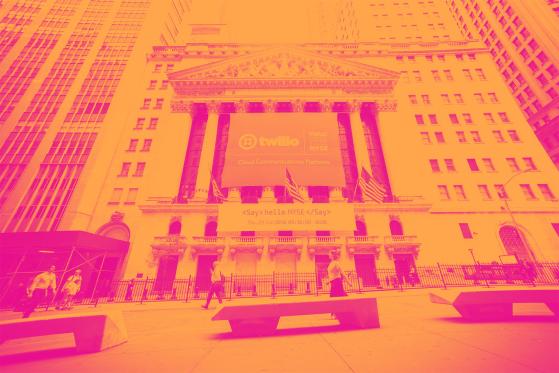As the Q3 earnings season wraps, let’s dig into this quarter’s best and worst performers in the software development industry, including Twilio (NYSE:TWLO) and its peers.
As legendary VC investor Marc Andreessen says, "Software (ETR:SOWGn) is eating the world", and it touches virtually every industry. That drives increasing demand for tools helping software developers do their jobs, whether it be monitoring critical cloud infrastructure, integrating audio and video functionality, or ensuring smooth content streaming.
The 11 software development stocks we track reported a strong Q3. As a group, revenues beat analysts’ consensus estimates by 3.3% while next quarter’s revenue guidance was 0.7% above.
Thankfully, share prices of the companies have been resilient as they are up 6.1% on average since the latest earnings results.
Twilio (NYSE:TWLO)
Founded in 2008 by Jeff Lawson, a former engineer at Amazon (NASDAQ:AMZN), Twilio (NYSE:TWLO) is a software as a service platform that makes it really easy for software developers to use text messaging, voice calls and other forms of communication in their apps.Twilio reported revenues of $1.13 billion, up 9.7% year on year. This print exceeded analysts’ expectations by 3.7%. Overall, it was a very strong quarter for the company with EPS guidance for next quarter exceeding analysts’ expectations and an impressive beat of analysts’ EBITDA estimates.
Interestingly, the stock is up 57.6% since reporting and currently trades at $111.20.
Is now the time to buy Twilio? Find out by reading the original article on StockStory, it’s free.
Best Q3: JFrog (NASDAQ:FROG)
Named after the founders' affinity for frogs, JFrog (NASDAQ:FROG) provides a software-as-a-service platform that makes developing and releasing software easier and faster, especially for large teams.JFrog reported revenues of $109.1 million, up 23% year on year, outperforming analysts’ expectations by 3.3%. The business had a very strong quarter with an impressive beat of analysts’ billings estimates and accelerating growth in large customers.
Although it had a fine quarter compared its peers, the market seems unhappy with the results as the stock is down 6.3% since reporting. It currently trades at $30.82.
Weakest Q3: Akamai (NASDAQ:AKAM)
Founded in 1999 by two engineers from MIT, Akamai (NASDAQ:AKAM) provides software for organizations to efficiently deliver web content to their customers.Akamai reported revenues of $1.00 billion, up 4.1% year on year, exceeding analysts’ expectations by 0.5%. Still, it was a slower quarter as it posted full-year revenue guidance roughly in line with analysts’ expectations.
Akamai delivered the weakest performance against analyst estimates, slowest revenue growth, and weakest full-year guidance update in the group. As expected, the stock is down 6.1% since the results and currently trades at $98.03.
HashiCorp (NASDAQ:HCP)
Initially created as a research project at the University of Washington, HashiCorp (NASDAQ:HCP) provides software that helps companies operate their own applications in a multi-cloud environment.HashiCorp reported revenues of $173.4 million, up 18.7% year on year. This result topped analysts’ expectations by 6.1%. It was a strong quarter as it also logged an impressive beat of analysts’ EBITDA estimates and billings in line with analysts’ estimates.
The company added 12 enterprise customers paying more than $100,000 annually to reach a total of 946. The stock is up 1.5% since reporting and currently trades at $34.12.
GitLab (NASDAQ:GTLB)
Founded as an open-source project in 2011, GitLab (NASDAQ:GTLB) is a leading software development tools platform.GitLab reported revenues of $196 million, up 31% year on year. This number surpassed analysts’ expectations by 4.1%. Overall, it was a strong quarter as it also produced EPS guidance for next quarter exceeding analysts’ expectations and a solid beat of analysts’ EBITDA estimates.
GitLab delivered the fastest revenue growth among its peers. The stock is down 9.8% since reporting and currently trades at $59.61.
Market Update
Thanks to the Fed's series of rate hikes in 2022 and 2023, inflation has cooled significantly from its post-pandemic highs, drawing closer to the 2% goal. This disinflation has occurred without severely impacting economic growth, suggesting the success of a soft landing. The stock market has thrived in 2024, spurred by recent rate cuts (0.5% in September and 0.25% each in November and December), and a notable surge followed Donald Trump's presidential election win in November, propelling indices to historic highs. Nonetheless, the outlook for 2025 remains clouded by the pace and magnitude of future rate cuts as well as potential changes in trade policy and corporate taxes once the Trump administration takes over. The path forward is marked by uncertainty.Want to invest in winners with rock-solid fundamentals? Check out our and add them to your watchlist. These companies are poised for growth regardless of the political or macroeconomic climate.
This content was originally published on Stock Story

Which stock should you buy in your very next trade?
With valuations skyrocketing in 2024, many investors are uneasy putting more money into stocks. Unsure where to invest next? Get access to our proven portfolios and discover high-potential opportunities.
In 2024 alone, ProPicks AI identified 2 stocks that surged over 150%, 4 additional stocks that leaped over 30%, and 3 more that climbed over 25%. That's an impressive track record.
With portfolios tailored for Dow stocks, S&P stocks, Tech stocks, and Mid Cap stocks, you can explore various wealth-building strategies.
